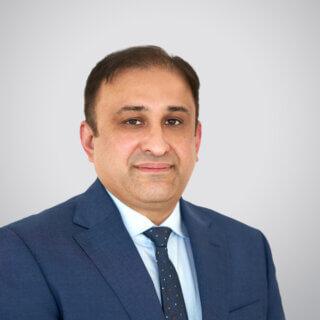Our Endocrinologists at King’s College Hospital Dubai are experts in a wide range of adrenal disorders. The adrenal glands, which are small glands found on each kidney, produce essential hormones including sex hormones and cortisol. Cortisol is responsible for regulating the metabolism (break down) of carbohydrate, fat and protein and also works with two other chemicals in the body, adrenaline and noradrenaline, to regulate the body’s response to stress.
Adrenal gland disorders happen when the gland makes too much or too little hormone. The causes of adrenal gland problems include:
- Tumours
- Inherited (genetic) problems
- Infections
- Problems with another gland such as the pituitary gland (which helps to control the adrenal gland)
- Medications for other conditions
Symptoms caused by adrenal disorders vary, depending on whether it is making too much or too little cortisol. Treatments for adrenal disorders depend on the specific problem; however, in most cases we can use surgery or medication to treat many adrenal gland problems.
Our Endocrinology Clinic can treat a wide range of adrenal disorders in adults, including:
Addison’s disease (adrenal insufficiency)
Addison’s disease is a rare condition that can affect men and women of any age. It’s caused when the adrenal glands don’t produce enough cortisol (and in some cases also a hormone called aldosterone). Symptoms include weight loss, weakness in the muscles, fatigue (extreme tiredness), low blood pressure and darkening of the skin. It can be caused by:
- Primary adrenal insufficiency: damage to the adrenal glands as part of an autoimmune disorder
- Secondary adrenal insufficiency: caused by a lack of ACTH, which results in the adrenal glands producing less cortisol
Your doctor will be able to advise you about your treatment options for Addison’s disease, which usually involve having hormone replacement medication.
Cushing’s syndrome
Cushing’s syndrome is rare, usually affecting adults aged 20-50, with women three times more likely to develop it than men. It’s caused when the adrenal glands produce too much cortisol. Symptoms include weight gain; thin skin that is easily bruised; weak bones or muscles; decreased libido (sex drive); fat deposits on the face; dark red stretch marks on the thighs, stomach, buttocks, arms, legs or breasts. It can be caused by long term treatment with steroid medication and, in some cases, a tumour (known as endogenous Cushing’s syndrome).
Your doctor will be able to advise you about your treatment options which can involve reducing or stopping steroid medication or, for endogenous Cushing’s syndrome, surgery to remove the tumour.
Pheochromocytoma
Pheochromocytoma is a tumour of the adrenal gland. It causes the excessive release of hormones that regulate the heart and blood pressure (epinephrine and norepinephrine). Symptoms include: panic attacks; headaches; hot flushes; sweating; palpitations; high blood pressure; mood swings; and weight loss. In most cases the tumour is benign but in some cases, they can be malignant (cancerous).
Your doctor will be able to advise you about your treatment options, which will depend on the type and size of tumour but can involve surgery, chemotherapy, drugs to lower blood pressure, and/or radiotherapy.
Hyperaldosteronism
Hyperaldosteronism, sometimes called aldosteronism, is when the adrenal glands produce too much of the hormone aldosterone into the bloodstream. Primary hyperaldosteronism is caused by problems in the adrenal glands themselves, whereas secondary hyperaldosteronism can be caused by a problem somewhere else in the body, causing the adrenal glands to over-produce the hormone. It’s more common in men and women aged 30-50 and symptoms include high blood pressure, fatigue (extreme tiredness), weakness of the muscles, numbness, paralysis that comes and goes, and a high level of calcium in the blood.
Primary hyperaldosteronism is normally caused by a benign (non-cancerous) tumour in the adrenal gland and it is treated with surgery whereas secondary hyperaldosteronism can usually be treated with medication and by limiting salt intake.
Your doctor will discuss your treatment options with you and advise you on the best treatment for your condition.
Renin-secreting tumours (reninomas)
Reninomas are benign (non-cancerous) tumours that produce excessive amounts of renin, an enzyme that is produced and stored in the kidneys that regulates blood pressure. Symptoms include high blood pressure, fatigue (extreme tiredness) and nausea. Your doctor will advise you on the best treatment which may be surgery to help reduce your blood pressure levels.
Non-functioning adrenal tumours (adenomas)
Adenomas are rare, benign (non-cancerous) tumours on the adrenal gland. In many cases, they do not cause any symptoms and may not need to be treated.
If you would like to know more about the adrenal disorders and the treatments we can offer, please get in touch. The consultants at our Dubai and Abu Dhabi medical centres have extensive experience and expertise in treating the full range of adrenal disorders. We’ll work with work with you to diagnose the issue and ensure you receive the best possible care. To find out more or to arrange an appointment contact us here.
احجز موعدًا







